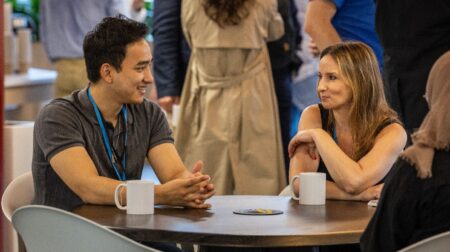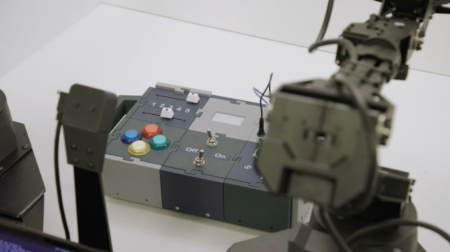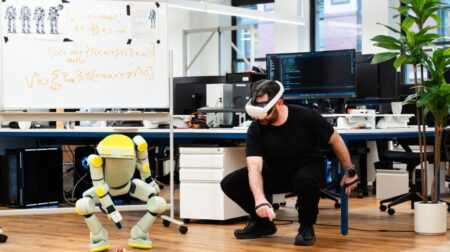Robotic ‘coaches’ that help aid upper limb rehabilitation for stroke and brain injury survivors have been trialled in Vienna, Austria as part of an international pilot study led by researchers from the UK’s National Robotarium.
The Virtual Health and Wellbeing Living Lab Infrastructure (VITALISE) project, funded by the EU Horizon 2020 programme and led by the National Robotarium’s Human Robot Interaction (HRI) team, has developed a system in which socially assistive robots communicate with a patient using a headset that detects the brain’s neural activity.
Developed in partnership with the AIT Austrian Institute of Technology, the robot then processes these signals to understand the user’s movement intention when carrying out exercises, providing real-time verbal motivation, visual mimicry, and feedback, as they complete specific movements.
It is hoped that the research will make it easier and more engaging for people to adhere to their prescribed self-managed rehabilitation routines by providing personalised support based on their individual needs, cognitive capability, and exercise pace.
Over the three-month study, the VITALISE team worked with 16 stroke and brain injury survivors and six therapists to test the robot-assisted rehabilitation system’s ability to understand user intention and provide personalised motivation.
READ MORE: Chinese scientists build robot controlled by human brain cells
Specifically, the team explored whether a robot could detect a person’s intended exercise movement using brain signal data and then mimic that motion in real-time to demonstrate an exercise.
Through questionnaires and interviews, researchers gathered important feedback on factors such as the robot’s success at motivating exercise over time, building user trust, and overall ease of use.
The evaluation methodology has enabled researchers to investigate the potential for socially assistive robots with neural interfaces to provide tailored support for self-managed rehabilitation.
Lynne Baillie, a professor of computer science at Heriot-Watt University and academic lead at the National Robotarium for human-robot interaction, assistive living and health, said: “We know that sustained, repetitive exercises are crucial for recovery after a stroke or brain injury. However, without supervision it can be challenging for survivors to stay motivated.
READ MORE: ‘World’s most advanced’ humanoid to be displayed in Scotland
“We envision a future where patients have access to personalised robotic coaches that support clinicians and experts to deliver even more successful rehabilitation journeys.
“Our research shows the incredible potential for these technologies to understand users’ needs and empower them to achieve recovery goals.”
The National Robotarium is part of the Data-Driven Innovation initiative, supported by £21m from the UK government and £1.4m from the Scottish government.
The initiative is part of a wider £1.5bn Edinburgh and South-East Scotland City Region Deal.
Innovations and achievements in life sciences will be highlighted and celebrated at the second annual Robotics & Automation Awards on 06 November 2024 at De Vere Grand Connaught Rooms in London. Visit www.roboticsandautomationawards.co.uk to learn more about this unmissable industry event – and to book your table today!








